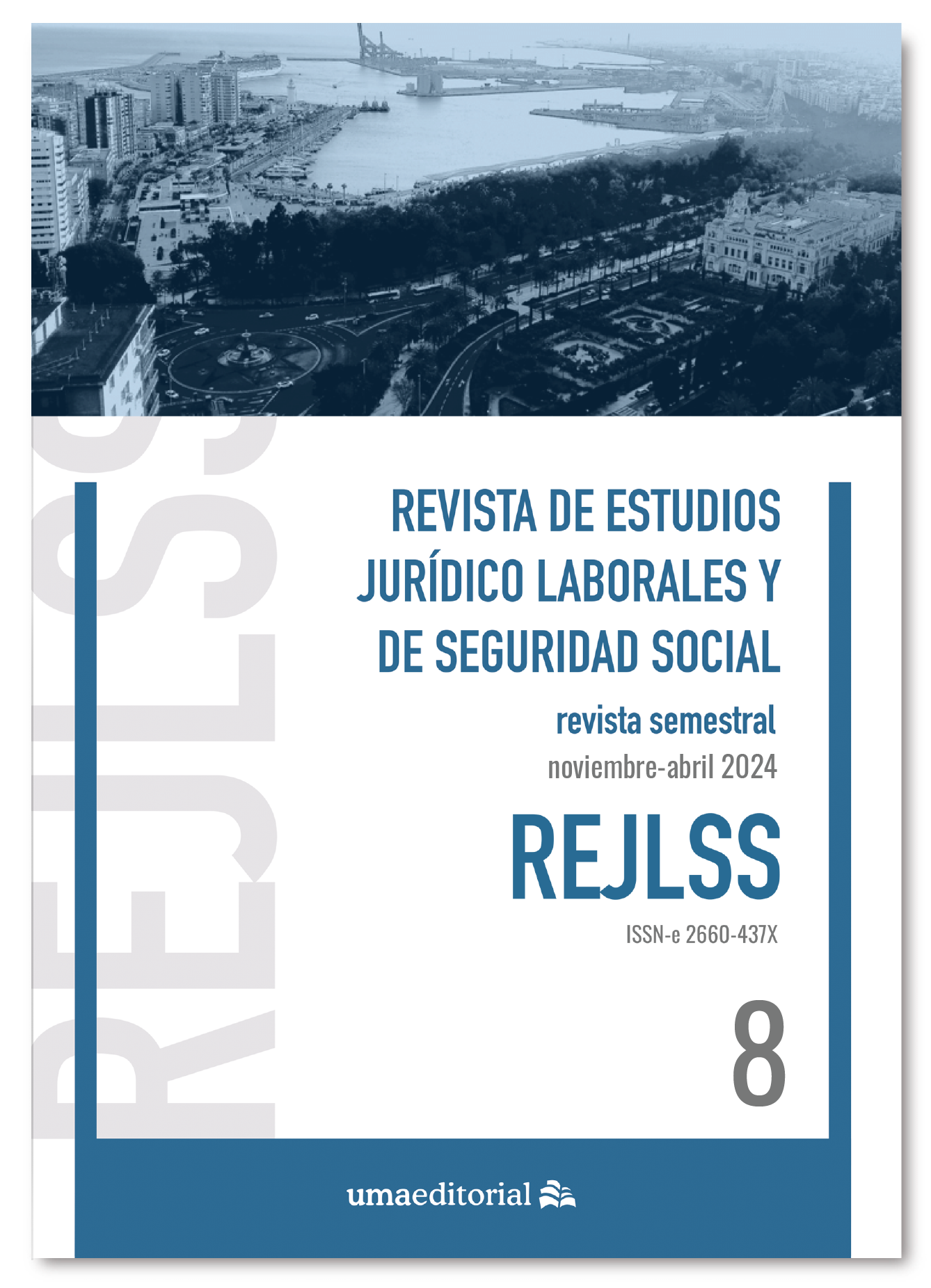European Union work life balance
DOI:
https://doi.org/10.24310/rejlss8202418944Keywords:
Work life balance, paternity leave, parental leave, care leave and force majeure leave, flexible working, protection of workers (employment, discrimination and dismissal)Abstract
Work life balance policies at EU has been developed in three different stages in order to improve and make work and life conditions more compatible. 1) Gender equality is linked to promoting the sharing of responsibilities between women and men in the private sphere, 2) Is characterised by the link between work-life balance and the labour market and business competitiveness, 3) Work-life balance is again linked to gender equality. Fathers are involved in the sharing of responsibilities. The result of this development is Directive 2019/1158, which has achieved autonomous recognition of work-life balance in the acquis communautaire and includes mechanisms to promote work-life balance. Mechanisms to facilitate the reconciliation of work and family life are included: paternity leave, parental leave and care leave, care leave and force majeure leave, flexible working arrangements for workers who are parents or carers, as well as measures to protect workers in the exercise of their reconciliation rights (employment, discrimination and dismissal).
Downloads
Metrics
Publication Facts
Reviewer profiles N/A
Author statements
Indexed in
-
—
- Academic society
- N/A
- Publisher
- Universidad de Málaga. UMA Editorial
References
Aguilera Izquierdo, R., “Los derechos de conciliación de la vida personal, familiar y laboral en la Ley Orgánica para la igualdad efectiva de mujeres y hombres”, Revista del Ministerio de Trabajo y Asuntos Sociales, núm. extra 2, 2007.
Aguilera Izquierdo, R. y Cristóbal Roncero, R., “Las políticas de conciliación de la vida laboral y familiar y su desarrollo normativo”, Tribuna Social, núm. 134, 2002.
Ballester Pastor, M.A., “Conciliación laboral y familiar en la Unión Europea: rémora, avances y nuevas líneas de tendencia en el ámbito de la corresponsabilidad”, Revista de Derecho Social, núm. 51, 2010.
Gorelli Hernández, J., “Un análisis normativo de la evolución de las políticas de conciliación en la Unión europea. De la maternidad a la corresponsabilidad”, Femeris, vol. 7 núm. 2.
Jurado Segovia, A., “Flexiseguridad y conciliación de la vida laboral y familiar”, Revista del Ministerio de Empleo y Seguridad Social, núm. extraord. 2018.
López Álvarez, M.J., “Conciliación y corresponsabilidad en el ordenamiento jurídico comunitario”, Revista Galega de Dereito Social, núm. 9, 2019.
Maneiro Vázquez, Y., Cuidadores. Igualdad y no discriminación y corresponsabilidad: la ®evolución de los derechos de conciliación de la mano de la Directiva UE 2019/1158, Bomarzo, Albacete, 2023.
Montoya Melgar, A., Derecho del Trabajo, 43ª ed., revisada y actualizada, Ed. Tecnos, Madrid, 2023.
Nieto Rojas, P., “La transposición de la Directiva 2019/1158 de conciliación de la vida familiar y la vida profesional a través del RDL 5/2023”, Revista de Estudios Jurídicos Laborales y de Seguridad Social (REJLSS), núm.7, mayo-junio 2023.
Pérez Campos, A.I.,” Los derechos de conciliación de la vida personal y familiar con el trabajo: evolución legislativa”, Revista del Ministerio de Empleo y Seguridad Social, núm. 133, 2017.
Rodríguez Escanciano, S., Diario La Ley, Sección Tribuna, 24 de marzo de 2020, La Ley 2768/2020.
Sánchez Urán Azaña, Y., “El concepto de trabajador en el contexto de la protección flexible del derecho del trabajo en la Unión Europea”, La Ley Unión Europea, núm. 50, 2017.
Downloads
Published
How to Cite
Issue
Section
License
Copyright (c) 2024 María Rosario Cristóbal Roncero

This work is licensed under a Creative Commons Attribution-NonCommercial-NoDerivatives 4.0 International License.
In the Revista de Estudios Juridico Laborales y de Seguridad Social (REJLSS) we are clearly committed to a policy of open access to scientific knowledge (See Berlin Declaration).
Those authors who have publications with this journal accept the following terms:
This journal provides immediate free access to its content under the principle of making research freely available to the public. All the contents published in the REJLSS are subject to the Creative Commons license
Attribution-NonCommercial-NoDerivatives 4.0 International (CC BY-NC-ND 4.0)
Copyrights are of two kinds: moral and patrimonial. Moral rights are perpetual, inalienable, non-transferable, inalienable, unattachable and imprescriptible prerogatives. In accordance with Spanish copyright legislation, the authors who publish in REJLSS retain the moral right over their work, as well as the ownership of the patrimonial right, which will be transferred to the University of Malaga for its dissemination in open access.
The patrimonial rights, refer to the benefits that are obtained by the use or disclosure of the works. REJLSS is published in open access and is exclusively authorized to perform or authorize by any means the use, distribution, dissemination, reproduction, adaptation, translation or transformation of the work.
It is the responsibility of the authors to obtain the necessary permissions of the images that are subject to copyright.
Authors whose contributions are accepted for publication in this journal retain the non-exclusive right to use their contributions for academic, research and educational purposes, including self-archiving or depositing in open access repositories of any kind.
The electronic edition of this magazine is edited by the Editorial of the University of Malaga (UmaEditorial), being necessary to cite the origin in any partial or total reproduction.
The authors may adopt other non-exclusive license agreements for the distribution of the version of the published work (eg: deposit it in an institutional telematic archive or publish it in a monographic volume) provided that the initial publication is indicated in this magazine.
Authors are allowed and recommended to disseminate their work through the Internet (eg, in institutional telematic archives or on their website) before and during the submission process, which can produce interesting exchanges and increase citations of the published work.







19.png)
